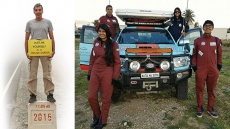Meditating for 15 minutes simply takes 1 per cent of our day, but the result is immeasurable
There’s no doubt about it, meditation is the newest “craze” that many in the western world are captivated by. Unlike the millennial trend of avocado toast, it is here to stay. Having been around for over 5,000 years, with roots in Asia, South Asians are familiar with the sacred practice. It has garnered attention from neuroscientists, intrigued by the claims holistic practitioners have made. This includes the reduction of symptoms of depression, anxiety, pain and insomnia.
Meditation and Self-awareness
Research has shown that those who meditate are in better control of their emotions, are more compassionate, and empathetic. This means that meditators may approach life in a more proactive manner, rather than just reacting. In today’s society, we are constantly bombarded with “indulgences” distracting us from the stress of everyday life. It is easy to resort to mind-numbing habits to “relax”, including binge-watching Netflix and overeating, as we’re not necessarily aware of our own habits. According to yoga teacher, Janeen Yuseef, “when we engage in intentional practices such as yoga, our daily activities can be practiced with greater awareness, and our desire for mindless activities naturally decreases. Yoga is the process of knowing yourself, you become more self-aware, present and less reactive.”

Meditation and Brain
Our brain can change based off the behaviours we engage in. By learning new behaviours, for example, brushing our teeth with our non-dominant hand, this results in new neural connections being created. At first, we may feel clumsy and uncomfortable using our non-dominant hand, but eventually, our brain becomes more familiar with the task. Similarly, as we meditate, new pathways are created within our brain.

Meditation and Memory
As we age, parts of our brain get smaller. Neuroscientists compared the brains of long-term meditators and twenty-five-year olds. They found that meditators had similar amounts of brain mass as the younger people, suggesting that meditation may decrease the aging of our brain. Researchers further studied the effects of meditation and found it is connected to an increased size in the brain area linked to memory called the hippocampus. We don’t have to memorize the parts of the brain, but what we want to remember is that the part of the brain responsible for memory and learning may increase in size. If this means we will actually remember where we left our cell phone, then a lot of us will likely start meditation today.

Meditation and Stress
According to Yuseef, “yoga and meditation allow us to relearn how to rest rather than continually being in a fight-or-flight response.” After working long hours at a stressful job while balancing life’s many priorities, we may lay awake at night, unable to sleep because our mind churns over a never-ending to-do list. This reality of stress and burnout is common for many. Research has shown that when we meditate the area in the brain linked to stress and in charge of our fight-or-flight response can shrink. This means that what we once found stressful becomes more manageable. Meditation is not a cure all for burn out but is a tool we can use to help make stress more manageable. As neuroscientist Sara Lazar puts it in her TED Talk, the environment doesn’t change, our relationship to the environment changes.
The brain is a mysterious part of the body, and as time goes on neuroscientists will learn more about the positive links between the mind and meditation. We are ever evolving people and meditation is just one of the tools we can use to become more compassionate, proactive and self-aware. It is up to us to determine whether we apply this knowledge to our lives. On a final thought, meditating for 15 minutes simply takes 1 per cent of our day, but the result is immeasurable.

How to Meditate:
Sit down, however feels most comfortable, either cross-legged or seated on a chair. Some prefer lying down but that may lead to one falling asleep.
Close your eyes and clear your mind, I know it’s easier said than done.
Focus on your breath, taking several long and deep belly breaths.
If focusing on your breath is difficult, check in with your body starting from our toes and working your way up.
You can tense and relax each part of your body. You might find your teeth clenched and shoulders hunched, signalling that your body is carrying the day’s stressors.
Your mind might jump from thought to thought. You can gently remind yourself to return your focus back to your breath.
Congratulations! Even if you were only able to focus for two minutes, you have successfully meditated!






